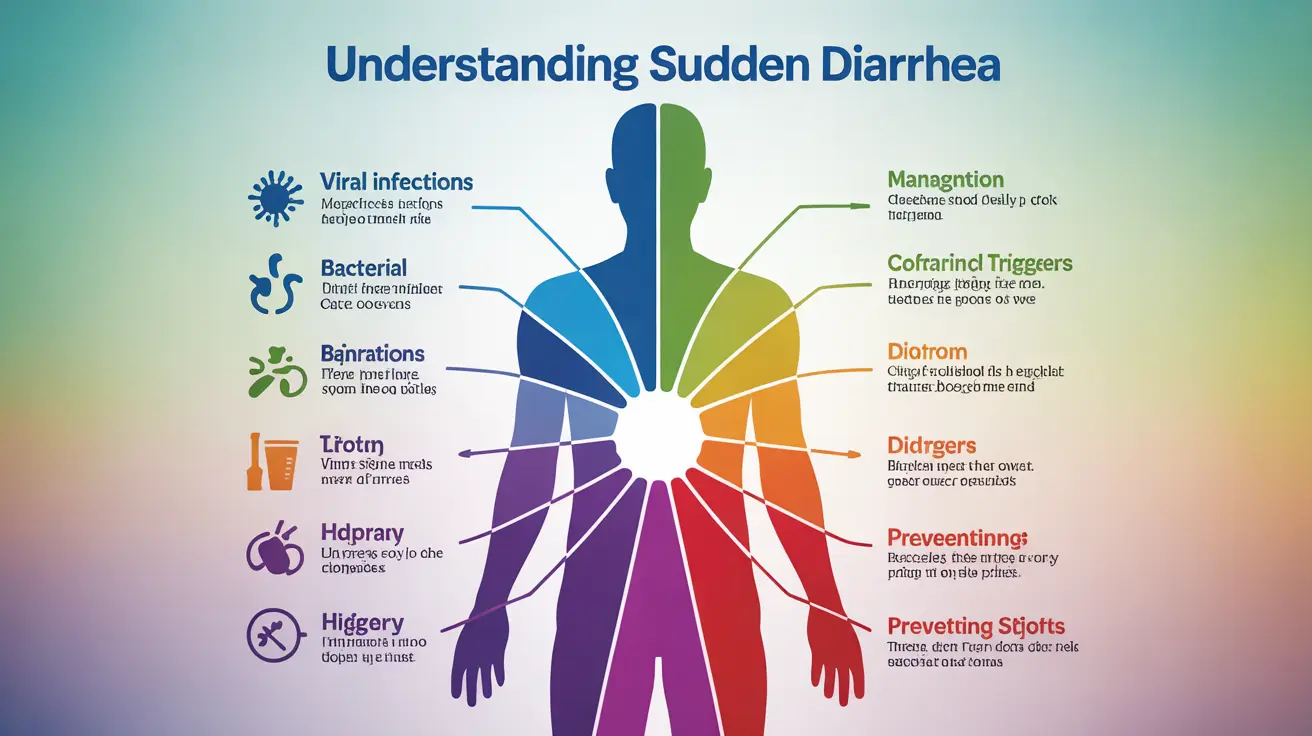Experiencing sudden diarrhea can be both uncomfortable and concerning. This unexpected digestive issue can significantly disrupt daily activities and may signal various underlying health conditions. Understanding its causes, management strategies, and warning signs is crucial for maintaining digestive health and knowing when medical attention is necessary.
In this comprehensive guide, we'll explore the common triggers of sudden diarrhea, effective treatment approaches, and essential prevention strategies to help you manage this challenging condition.
Common Causes of Sudden Diarrhea
Sudden diarrhea often occurs due to several distinct factors, each requiring different approaches to treatment:
Viral Infections
Viral gastroenteritis, commonly known as stomach flu, is a leading cause of sudden diarrhea. Norovirus and rotavirus are frequent culprits, spreading easily through contaminated food, water, or close contact with infected individuals.
Bacterial Infections
Food poisoning from bacteria like Salmonella, E. coli, or Campylobacter can trigger acute diarrhea. These infections typically result from consuming contaminated food or beverages.
Dietary Triggers
Certain foods and beverages can cause sudden diarrhea, including:
- Artificial sweeteners
- Excessive caffeine consumption
- Spicy or very fatty foods
- Food intolerances or allergies
- Alcohol
Managing Sudden Diarrhea at Home
When experiencing sudden diarrhea, several home management strategies can help alleviate symptoms and prevent complications:
Hydration
Maintaining proper hydration is crucial. Focus on:
- Clear broths
- Water
- Oral rehydration solutions
- Clear sports drinks (in moderation)
Dietary Modifications
Follow the BRAT diet (Bananas, Rice, Applesauce, Toast) initially, then gradually reintroduce other foods as symptoms improve. Avoid dairy products, caffeine, and fatty or spicy foods until recovery.
When to Seek Medical Attention
While many cases of sudden diarrhea resolve independently, certain symptoms warrant immediate medical attention:
- Severe abdominal pain
- High fever (over 102°F/39°C)
- Blood in stool
- Signs of severe dehydration
- Symptoms lasting more than 3 days
- Frequent vomiting preventing liquid intake
Prevention Strategies
Implementing proper preventive measures can significantly reduce the risk of sudden diarrhea:
Hand Hygiene
Maintain thorough hand washing practices, especially before handling food and after using the bathroom. Use soap and warm water for at least 20 seconds.
Food Safety
Practice proper food handling and storage techniques. Avoid cross-contamination and ensure meats are cooked to safe temperatures.
Travel Precautions
When traveling, particularly to developing countries, take extra precautions with food and water consumption to prevent traveler's diarrhea.
Frequently Asked Questions
What are the most common causes of sudden diarrhea and how can I identify them?
Common causes include viral infections (stomach flu), bacterial infections (food poisoning), food intolerances, and dietary triggers. Identify them by noting recent food consumption, onset timing, and accompanying symptoms like fever or vomiting.
When should I seek medical attention for sudden diarrhea symptoms?
Seek medical care if you experience severe abdominal pain, high fever, bloody stools, signs of dehydration, symptoms lasting more than 3 days, or inability to keep liquids down due to vomiting.
How can I manage sudden diarrhea at home and prevent dehydration?
Stay hydrated with clear fluids, follow the BRAT diet, rest, and consider over-the-counter anti-diarrheal medications if appropriate. Monitor for signs of dehydration and maintain good hand hygiene to prevent spread.
Can certain medications or foods trigger sudden diarrhea and what should I do about it?
Yes, medications like antibiotics and foods such as artificial sweeteners, dairy products, and spicy foods can trigger diarrhea. Keep a food diary to identify triggers and avoid problematic items. Consult your healthcare provider about medication-related issues.
What precautions can I take to prevent traveler's diarrhea when visiting foreign countries?
Drink only bottled or boiled water, avoid raw foods and street vendor meals, eat only thoroughly cooked foods, and use bottled water for brushing teeth. Consider consulting your healthcare provider about preventive medications before travel.




